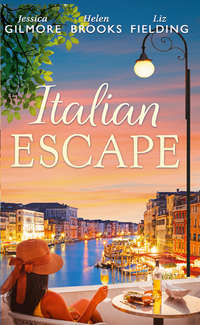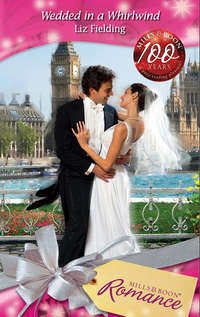
Полная версия
A Suitable Groom


Her perfect date?
Veronica Grant needs a man to take to her cousin’s wedding in order to keep her matchmaking mother at bay. A man like Fergus Kavanagh. He’s perfect—rich, charming and sexy. If he accompanies Veronica, her mother won’t mention marriage for weeks!
Luckily, Fergus has matchmaking relatives of his own he wants to avoid, so he proposes a pact: he will be Veronica’s pretend lover if she becomes his! Now he just needs to remember it’s all an act… even though their sizzling chemistry feels oh-so-real!
A Suitable Groom
Liz Fielding

www.millsandboon.co.uk
Table of Contents
Cover
Excerpt
Title Page
CHAPTER ONE
CHAPTER TWO
CHAPTER THREE
CHAPTER FOUR
CHAPTER FIVE
CHAPTER SIX
CHAPTER SEVEN
CHAPTER EIGHT
CHAPTER NINE
CHAPTER TEN
Copyright
CHAPTER ONE
‘THANKS for the lift, Nick.’
‘It’s the least I can do, considering you turned up at six this morning to go over those figures with me.’ Nick Jefferson lifted Veronica’s small suitcase from the boot. ‘Call me when you know which train you’re catching back tomorrow and I’ll pick you up. In fact, why don’t you come to supper? Cassie’s working on a new recipe; I know she’d welcome a totally unbiased opinion, and you haven’t been near her in weeks.’
‘Your wife should be putting her feet up with the baby so near,’ Veronica replied quickly. ‘Not slaving over a hot stove for any Tom, Dick or Jane you invite home.’
‘Come to supper and you can tell her yourself to take it easy, along with your opinion on her recipe,’ he informed her. ‘Maybe she’ll listen to you.’
‘I doubt it.’ Veronica relieved him of her case. ‘Besides, there’s more than one way to keep a lady in bed, Nick. Offer to rub her back … or something.’
He grinned. ‘Now why didn’t I think of that? Hey, don’t forget your hatbox.’ She pulled a face. ‘Anyone would think you don’t want to go to this wedding.’
‘I don’t much,’ she said. ‘I love my cousin dearly, but family weddings are fairly close to the bottom of my list of favourite events. One above going to the dentist. Maybe. My dentist makes me laugh.’
‘Then why go? It’s not compulsory, is it?’
Veronica offered Nick a wry smile. ‘My family take weddings seriously; you’re expected to turn up unless you’ve got a doctor’s note confirming the plague.’ She regarded the hatbox with dislike. ‘You don’t happen to know a bribable doctor, do you?’
‘I’m afraid not. Would a note from the boss do? “Veronica can’t come out to play until she’s finished a report on the marketing of our latest line in camp fridges to Eskimos—”’
She laughed. ‘Heaven forbid. I get enough grief from my mother about putting my career first as it is.’ She took the cumbersome hatbox from him. ‘I’d better go. Missing the train would not be an acceptable excuse either.’
Fortunately, the eight-fifteen had a dining car—the six o’clock start had left her feeling hollow, and it was going to be a long day. The steward smiled as he spotted her. ‘Morning, Miss Grant. Here, let me take your bag.’
‘Thank you, Peter,’ she said, surrendering her small suitcase and dropping her hatbox onto the vacant chair at the two-seater table before settling herself in the opposite seat, glancing out at the platform in that still moment of expectancy while the guard glanced along the length of the train to make sure all was clear. Then, as the man raised his whistle to his lips, his attention, and hers, was caught by the brisk, sharp sound of leather-shod feet pounding up the stone steps.
‘Hold that door!’
The latecomer had called out with the confident ring of someone used to instant obedience. He got it, and Veronica found herself holding her breath as a tall, lithe figure sprinted across the platform and boarded the train. The door banged shut, the whistle blew, the train slid seamlessly from the station.
‘Ready to order, miss?’
She turned to the steward. ‘Do my eyes deceive me, or was that Fergus Kavanagh, Peter?’ she asked, surprised. She would have bet any amount of money that the Chairman of Kavanagh Industries was a chauffeur-driven Rolls man.
‘Yes, miss. Travels with us most mornings. As he says, if he doesn’t travel with us, who will?’ He grinned at her raised eyebrows. ‘He does own a sizeable chunk of this line. Do you know him?’
‘No,’ she said. ‘Not yet.’
Fergus Kavanagh was normally the most even-tempered of men, although he would have been the first to admit that he couldn’t take any great credit for that. It was simply that very few people went out of their way to irritate him.
Today, however, was not normal.
Today he would have positively welcomed the opportunity to strangle two of the most interfering, the most infuriating women it was his misfortune to be related to.
The guard, his whistle to his lips, held the door for him as he raced up the stairs to catch the eight-fifteen train into London. ‘You’ve cut it a bit fine this morning, Mr Kavanagh.’
‘I seem to be cutting my entire life a bit fine at the moment, Michael,’ Fergus replied, without any noticeable lack of breath, as he stepped aboard.
The other man grinned. ‘It’s always the same with weddings. I’ve seen two daughters through it; I know what it’s like. Just you concentrate on how peaceful it’ll be when it’s all over, and you’ll sail through it.’ And with those words of comfort the man blew his whistle and slammed the door.
Peace. As Fergus made his way through the crowded carriages in the direction of the restaurant car the word flickered tantalisingly, like a beacon just out of reach. Peace was a concept that had always seemed just to elude him, but he had believed, he had really believed, that after Dora’s wedding it might at long last be attainable.
With both his sisters married, and now the responsibility of their respective husbands, he could concentrate on business, his estate and the simple pleasures available to a bachelor of means. He was a collector. He collected fine art, fast racehorses and profitable companies.
He should have known better. Even up to their eyes in such desperately important last-minute decisions as colour schemes for flowers and balloons, the problem of how they were going to seat three women who had all, at one time or another, been married to the same man, and where in the world they were going to find a small boy who would not object to wearing satin knee breeches, Poppy and Dora, his two darling sisters, had still found time to plot yet more mayhem with which to plague him.
Well, they could plot without him. He refused to take any further part in the proceedings. His club might be dull, but women were excluded from any part of it, and with Dora in temporary possession of his house he was quite prepared to stay there until the wedding. He would have stayed there until after the wedding, until every vestige of confetti had been plucked from the borders, every trace of heel-marks removed from his immaculate lawns by a bad-tempered gardener. Unfortunately, it was his duty to give away the bride and, since duty was something he had never shirked, that small personal revolution was denied him.
He paused at the entrance to the dining car and caught the steward’s eye.
‘Good morning, Mr Kavanagh. We’re a bit full this morning. The ladies seem to be taking advantage of the special discounted fare to visit the spring sales. We don’t usually see you on Friday,’ he said, glancing around, ‘or I’d have kept you a table. I’m afraid you’ll have to share …’
Yet more irritation. He was not in the mood for company. He had been looking forward to a quiet journey, during which he could read the City pages and forget all about his sister and her wedding.
Instead, he found himself being shepherded towards a two-seater table where a woman was perusing the menu.
No, that really was the last straw. The barrier of a newspaper was enough to deter most men from fatuous conversation; women, he knew from experience, were trickier. Bringing up two younger sisters had taught him just how tricky they could be. Peter should really know better than that. But one glance was sufficient to reassure him; the seat opposite her was occupied by a large hatbox. Excuse enough to move on.
He spotted an empty space at the far end of the compartment, but as he turned to point it out to the steward the woman forestalled him.
‘Do move that tiresome hatbox and sit down,’ she invited, in a low, husky voice. She had lowered the menu a little, and was regarding him over the top of it so that he could see a sweep of smooth platinum-blonde hair and a pair of the most extraordinary silver-blue eyes. As he hesitated, torn between a desire to avoid company and common courtesy, the expression in those eyes suggested that she knew precisely what was going through his mind, and was sufficiently entertained by his dilemma to stir the pot a little and see how he coped. ‘I don’t bite,’ she promised, without a trace of a smile.
Under normal circumstances he would simply have murmured something polite but distant and kept on moving. It was her eyes that kept him riveted to the spot, her eyes and her air of authority, of a belief in herself and confidence that he would do exactly as she said. Rare qualities in a woman. Rare enough to divert him from his purpose, although her beauty alone should have been enough for that.
Assured, elegant, she was old enough to be interesting, young enough to turn heads. No. That was wrong. She had the kind of bone structure that would still be turning heads when she was ninety. And she was definitely not going to the spring sales. The heavy grey silk of her skirt was too perfect a complement for her eyes to be a chance bargain, and the pearl studs in her beautifully shaped ears had the lustre that only a natural oyster could produce. A lustre that the lady herself matched to perfection.
He realised with something of a shock that she was one of the loveliest women he had ever seen. Yet there was more than beauty; there was a touch of mischief in those eyes that made him absolutely certain that she would prove a far more entertaining companion for the journey than his newspaper. His suddenly heightened pulse-rate was evidence enough of that. The distant table and its promise of a peaceful journey quite suddenly lost its appeal. But eagerness would be a mistake.
‘If you’re quite sure I wouldn’t disturb you? I could easily sit further along—’ The train lurched obligingly just at that moment, so that he was forced to grab the back of her seat. He smiled apologetically. ‘Perhaps I’d better just sit down.’
‘Perhaps you had,’ she agreed, her answering smile polite, nothing more. And yet there was something.
Intrigued, he lifted his overnight bag onto the luggage rack next to a small Vuitton suitcase that presumably was the property of the lady. Then he picked up the hatbox.
It was light, but awkward. Clearly too large for the overhead luggage rack, and there was no room for it beneath the table, although checking this out had given him the opportunity to admire a pair of long, slender legs and narrow, well-shod feet that matched the rest of the lady.
The hatbox, however, remained a challenge to his ingenuity. But not for long.
Thrust into control of a major industrial conglomerate whilst still in his twenties, Fergus Kavanagh did not lack ingenuity, and he had fine-tuned delegation to an art form. He turned and handed the box to the steward.
‘Perhaps you would be good enough to find somewhere safe to stow this, Peter,’ he said, then sat down, nodded briefly to his breakfast companion and flicked open his copy of the Financial Times. It was what that reserved creature of habit, the English businessman, would be expected to do, and every instinct was telling him that the lady would not allow him to ignore her for long.
For a moment Veronica regarded the crisply cut dark head of hair, the glimpse of broad forehead and long, rather thin fingers holding the paper—all that was visible of Mr Fergus Kavanagh behind his Financial Times. And she was glad of a moment’s respite.
Her heart was pounding like a drum. She hadn’t felt so nervous since she had negotiated her first big contract. Kavanagh’s business career suggested a man prepared to take a risk, prepared to be unconventional, but on first acquaintance he seemed nerve-rackingly distant, a touch austere.
Yet there was something about the way he was holding his newspaper, a stillness that suggested he was not reading but waiting for her to make a move.
Then there was that promising smile, brief though it had been, fanning laughter lines about his eyes, almost as if he knew … Maybe, beneath the disguise of that pinstriped suit and old-school tie, there beat the heart of an adventurer after all. She certainly hoped so. In fact, she was counting on it.
‘Would you care to look at my menu?’ she asked after a moment. ‘Whilst Peter is disposing of my hat?’
Fergus smiled under cover of his newspaper. He was human enough to enjoy being proved right. The lady’s looks were Grace Kelly cool, but her voice was as sexy as sin—sin leavened with laughter. He suspected that if he peered over his newspaper those silvery eyes would be laughing at him, too, perfectly aware that his initial intention had been to pass her by, delighted that she had waylaid him. But why? She didn’t look like the kind of woman who picked up strangers over the breakfast table, so why did he have the feeling that he had just been caught on a hook and was about to be reeled in?
‘Thank you,’ he replied, gravely polite, glancing at her briefly. Definitely laughing. The deepening creases at the corners of her mouth gave him an odd little lift to his spirits, banishing the black mood in which he had boarded the train. ‘But that won’t be necessary,’ he said, countering her move and then making one of his own. ‘Peter knows what I want.’
He was offering her an opening, and he wondered what she would do with it. Start with a polite question, perhaps? You travel on this train regularly, then? Or maybe it would be disbelief. You mean, you have the same breakfast every day? Or maybe she would take his response as a rebuff and let it go. He didn’t think so. The lady wanted something. Bachelors, wealthy bachelors, developed a sixth sense for such things.
She kept him waiting for a longish pause, during which Fergus found it quite impossible to concentrate on the headline in front of him. Then she said, ‘The piece about your takeover bid is on page fourteen. If that is what you’re looking for.’
Takeover? So, she not only knew who he was, but followed the financial pages. He was right. She was a lot more interesting than the newspaper. He lowered it for the pleasure of looking at her more directly. And she was lovely. More than lovely. There was nothing of the chocolate box beauty about her; it went deeper than that, deeper than bone structure, perfect skin, gleaming hair. There was much more to her than that—character, a mouth quick to laugh, eyes to die for. Being reeled in by this lady, he decided, would be a pleasure.
‘Takeover?’ he queried, taking the bait.
‘Your takeover of GFM Transport. There’s a photograph of you along with the article. Not a very flattering one, I have to admit.’ She paused again. ‘But then, newspaper photographs are always rather lifeless, don’t you think?’ She made the smallest, most expressive of gestures with long, slender fingers. ‘I thought perhaps you were interested in what the FT had to say about it.’ Her shoulders moved imperceptibly in a minimalist shrug. ‘The takeover, that is. But maybe you’re not that bothered.’ Then, when he didn’t immediately reply, she said, ‘I’m sorry. I shouldn’t have interrupted you.’ She wasn’t sorry. ‘The journalist suggested that it was an “astute” move,’ she added encouragingly. Not a bit sorry.
‘Astute?’ Fergus folded the newspaper and put it on the table. A woman who read the FT was interesting enough to break through even the legendary reserve of the British male, and he was sure she knew it, had banked on it. ‘He wasn’t concerned that I was tying up capital in something of a sideshow?’ he asked, testing her a little to see whether she had actually read the article, or merely scanned the headline.
‘Is that what your board thought?’ she asked. Some of them. Not that it was any of her business. But it had been the right question.
‘Is that what you think?’
‘It would be presumptuous of me to have any kind of opinion on the matter. I’m sure you know what you’re doing. But I’ve interrupted you for long enough. Please do continue reading your newspaper, Mr Kavanagh.’ She let the line out a little, a skilled angler playing him like a big game fish, taking care not to strike too quickly.
‘Thank you,’ he said, a touch drily, but he continued to regard her thoughtfully as she handed the menu card to Peter and ordered her breakfast. ‘Should I know who you are?’ he asked, once the steward had departed.
‘Should you?’ Veronica’s heart was still beating too fast. Lord, but he was perfect. Exactly the man for the job. He didn’t immediately answer her, taking his turn to keep her waiting. She smiled as she acknowledged his silence … This was a game and she sensed that he knew it. But would he be prepared to play? ‘There’s no reason why you should, Mr Kavanagh. My name is Veronica Grant. I’m Marketing Director for Jefferson Sports.’ And she offered him her hand.
Slim, fine-boned, ringless, her nails polished to a deep plum-coloured perfection—a perfect complement to her lovely mouth, Fergus thought, dragging his mind back from the orchard at Marlowe Court in high summer, and his boyhood raids on the sweet dark fruit that grew there.
But then, everything about her was perfection, from the curve of her platinum-blonde hair to the toes of her handmade shoes.
Jefferson Sports. They had their headquarters in the centre of Melchester, an elegant tower block with an exclusive shopping mall in the atrium. The company had grown out of all recognition since it had been formed by a family of well-known sportsmen to take commercial advantage of their name, but since Nick Jefferson had stepped into the top slot it had begun to spread its wings and take off in a big way. And this woman was part of the team. More than interesting.
‘How d’you do, Miss Grant?’ he said, taking her hand and shaking it solemnly.
‘How d’you do, Mr Kavanagh?’ she replied, with equal gravity. The steward arrived with a large tray. Two boiled eggs, brown toast and China tea for her. A pair of kippers, white toast and coffee for him. ‘Please, do read your newspaper,’ Veronica invited while the steward laid out the food. ‘I shan’t mind a bit. You probably hate conversation over breakfast. Most men seem to.’
He found himself wondering whom she shared her breakfast with. Then rather wishing he hadn’t.
Besides, she shouldn’t make unfounded judgements about him. He was not antisocial over breakfast. When Dora and Poppy stayed over at Marlowe Court, with or without their partners, he was more than happy to talk. Well, usually he was happy to talk. Not today. Today he was furious with the pair of them.
Miss Grant, however, mistook his silence for assent. ‘I’ve disturbed the smooth start to your working day,’ she continued apologetically. ‘I do hope you won’t be short-tempered with your secretary because of me.’
‘I can assure you, Miss Grant, that the smooth running of my day was severely disturbed long before I boarded this train. And, since I’m not going to my office, my secretary is quite safe. But then, she’s far too important to my well-being to be used as a verbal punchbag.’ Her eyes lingered momentarily on his business suit, but she didn’t enquire where he was going, or why. Instead, she began to lightly tap the shell of her egg. Fergus found her lack of curiosity profoundly irritating. Women were supposed to be terminally inquisitive, weren’t they? He buttered his toast and forked up a mouthful of fish. ‘Today,’ he said before he could stop himself, ‘I have to see my tailor.’
That wasn’t entirely true. He didn’t have to visit his tailor today. Any time next week would have done, but it had made as good an excuse as any for fleeing his own house in the middle of his sister’s wedding preparations. Not that Dora had looked as if she had believed him. But then, Dora was irritated at having her plans frustrated.
‘Your tailor?’ Veronica Grant didn’t look as if she believed it, either. ‘Oh. I thought there might be some crisis with the takeover.’
His eyebrows rose. ‘Are you an interested stockholder by any chance?’ he demanded.
‘No,’ she said, not in the least intimidated by the sudden fierceness of his answer. ‘Just interested.’
Her smile almost knocked him back in the seat. He would have suspected that she was flirting with him, except that people didn’t flirt with total strangers on the eight-fifteen train into London. At least, not in his experience.
Maybe it was time he widened his experience. He got a charge when one of his horses won a race, but it didn’t match this.
He tried a smile of his own. It wasn’t at all difficult. His irritation had quickly evaporated in the company of this intriguing woman. ‘To be honest, the visit to my tailor is an excuse,’ he confided—since she didn’t believe him, he might as well make a virtue out of owning up. ‘My real reason for going up to town is to escape the mayhem of wedding preparations. I can assure you that a takeover is a piece of cake compared to the effort that seems to be involved in organising something as simple as a marriage ceremony.’
‘You’re getting married?’ That shook her. She covered it with another of those smiles, but she hadn’t planned on that. Well, that was all right. Wedding bells didn’t form any part of his plans, despite his sisters’ plots.
‘Me? Heaven forbid.’ Just so that she knew he wasn’t in the marriage market. ‘And in the unlikely event that I should ever be rash enough to take a plunge into that shark-infested pool, Miss Grant, I shall do it with the minimum of fuss. There will be no balloons, flowers or bridesmaids. I will not have a marquee erected on my lawn, or invite four hundred people to break my gardener’s heart, trampling through his borders.’
Veronica Grant took a spoonful of egg. Why on earth was her hand shaking? She simply wanted to borrow the man for the day, not marry him. Marriage played no part in her future plans. ‘The lady you decide to marry might have other ideas,’ she pointed out, before eating it.
‘Then the lady will have to make up her mind whether she wants a fancy wedding or a husband. I have two sisters, Miss Grant. One has already gone through the above performance. The second is about to do so. No man should be expected to go through it a third time.’
‘They do say three’s a charm.’
‘Do they?’ Fergus was not about to let that pass unchallenged. ‘Then they—whoever they are—are talking through the back of their collective heads.’
‘I see.’ The lady was trying to hide a smile.
‘It’s not funny, Miss Grant.’
‘Of course it isn’t. In fact, I endorse your sentiments wholeheartedly.’ But the smile didn’t leave her eyes. It was irresistible. He just couldn’t help smiling back. ‘So you’re taking refuge in your gentleman’s club?’









